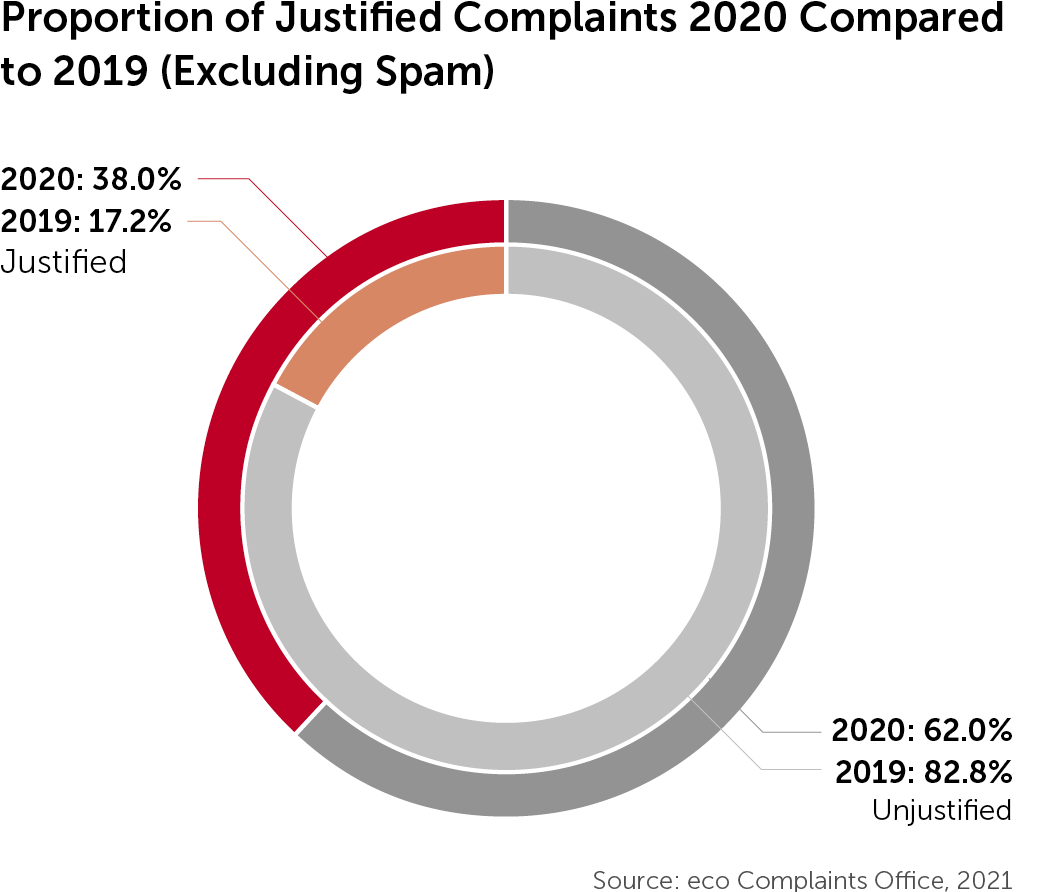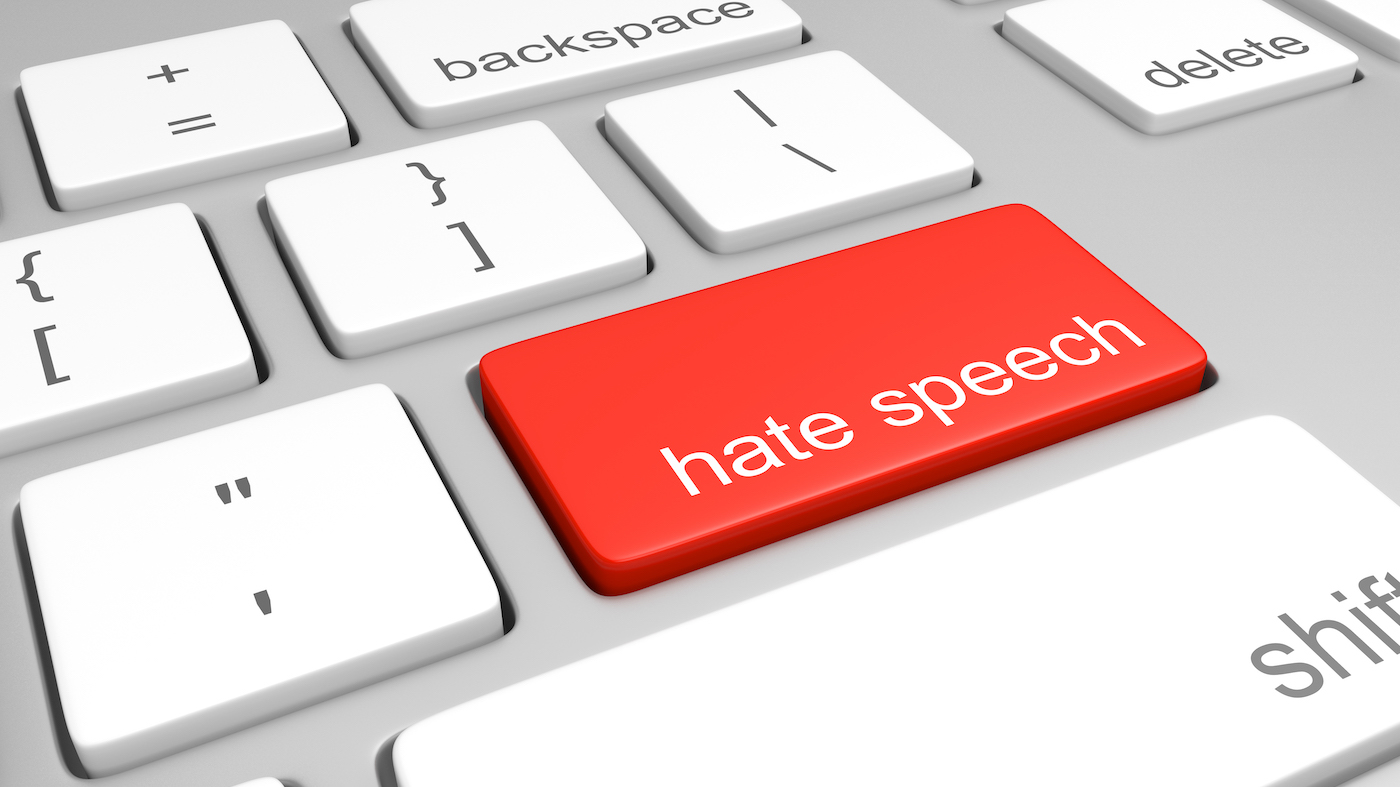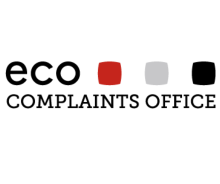Together for the Good of the Internet
Alexandra Koch-Skiba from the eco Complaints Office, on 25 years’ cooperation with providers and law enforcement, and minimizing risks for young people online.

© ipopba | istockphoto.com
The eco Complaints Office has been fighting illegal content on the Internet since 1996. It is embedded in the system of regulated self-regulation and has, in particular, the task of improving and promoting youth protection on the Internet. The hot-off-the-press 2020 Annual Report launched online yesterday shows that the independent hotline is making a significant contribution to the take-down and criminal investigation of illegal content: With a total of 5,523 cases, the number of justified complaints with a clear violation of the law was higher in 2020 than ever before and has increased by almost 19 percentage points compared to the previous year. In an interview with Alexandra Koch-Skiba, Head of the eco Complaints Office, dotmagazine talks about these figures and allows us to gain valuable insights into current circumstances during Corona times.
dotmagazine: 2021 is a landmark year for the eco Complaints Office. You have been promoting the responsible use of the Internet for 25 years and are marking your anniversary with the motto, “Together for the Good of the Internet.” Do you see this anniversary as an important milestone for the industry – and user protection in general?
Alexandra Koch-Skiba: Ultimately, the absolute milestone was the founding in 1996 of the working group then known as the Internet Content Task Force (ICTF), from which the Complaint’s Office as we know it today emerged. After a period of member-only support, the reporting options were opened up to Internet users in general, too, still following a self-regulatory approach. For me, that was the real milestone. As was predicted, self-regulation of the Internet has proven to be the best way forward; not just for the industry, but for society as a whole.
Twenty-five years down the road, this year our anniversary is a very good opportunity to once again highlight our service; to inform not only stakeholders but also the public about what we are doing and what we have achieved in these 25 years, about who our partners are, and what procedures we implement. It’s also a great opportunity to convey the vital information that everybody has to play a part, and to communicate which important roles stakeholders are already playing. Also, when looking towards the future, I think 25 years provides a strong impetus to think about new collaborations and network partners and to strengthen the already existing networks.
dot: On the subject of present times: due to Covid-19, with more and more people regularly online, many people expected the number of complaints to sky-rocket. But the Complaints Office’s 2020 Annual Report – which was launched yesterday as an online event in the English language for the international audience – shows that this hasn’t actually happened. Were you yourself surprised by this – and why do you think the numbers didn’t go up?
Koch-Skiba: Was I surprised? Not really. Being more online and having more screen time doesn’t automatically mean that people are distributing more illegal content or discovering more content that they think is illegal – I really believe that most people are using the Internet for good purposes, so to speak.
If you’re using the Internet for beneficial purposes such as business, home-schooling or communication with friends and loved ones, how would this lead to more illegal content or to identifying more illegal content? Bearing that in mind, I’m not really surprised that there’s been no huge increase in reporting. And on another note: in the Complaints Office, we’ve often seen ups and downs in the past – there were always years when the number of registered report numbers increased, and other years where they fell. So it’s kind of a norm for us to see some peaks here and there.
dot: That leads us to the next question, which is: While the overall numbers of complaints didn’t swell from 2019 to 2020, a graph from the Annual Report (as depicted below) shows that the number which were justified did grow significantly. Could this mean that users are generally becoming more astute (or, to use the colloquial term savvy) when it comes to what really represents prohibited or youth-endangering content?
Koch-Skiba: It’s really hard to give a reliable answer here. This could be just like the ups and downs in numbers of received reports. In this case, what we have seen in the past is that the proportion of justified complaints declined over a period of two or three years. So while we now have a rise, there was a drop in numbers beforehand. This means I’d have a look at this in two or three years’ time to see if it’s really a trend.

There are two possible outcomes as I see it: In one scenario, there might be a recognition that people are more aware of the things that are really illegal and are more primed to report these. Another scenario could be that, in looking back, it turns out just to have been coincidental that the proportion of justified complaints increased this year. In the end, a trend can only be determined after a number of years.
dot: When it comes to harmful and illegal content, the core approach of the eco Complaints Office is that of “take-down instead of blocking”. In a prior interview with dotmagazine, you provided a very lucid explanation for this: If you’re blocking content, it’s just like putting a curtain before the window – the content is still online, people can still have access to it easily, and the incentives are still there for those producing it. Take-down, on the other hand, eliminates the content. Here’s a follow-up question: Do you believe that take-down is also the best way for preventing illegal content from getting up there in the first place?
Koch-Skiba: I don't know if people really stop distributing illegal content if they are aware that it will only be taken down offline afterwards; people who really want to misuse the Internet will do so as long as there are no real consequences for them. While taking down the material is one consequence, there’s a need to go a step further. In most cases, it’s not only illegal content, it’s also a criminal act. As a result, it’s really important to collaborate with law enforcement here.
And that’s something we’ve been doing right from the beginning: making law enforcement aware of content distributed online. This means that they can start their investigations and, as a consequence, the people distributing the content will go to court, will get fines, and potentially go to prison. In addition to take-down, that’s a second very important step that should and can be undertaken.
dot: With intensified home schooling, there’s hardly a parent out there who is not anxious about their teenagers or even younger children being confronted with disturbing Internet content. Many parents are probably wringing their hands and wondering how best to tackle this. Have you any advice or tips on this?
Koch-Skiba: There are two tips that parents or guardians should have in mind. The first tip is: Stay in touch, talk to your children, and listen to them. You need to know what they are doing, how they feel about it, if there’s something strange going on. So just stay in touch – that’s the first and really the most important thing. And the second one is: If you want to have some support in minimizing risks, then use the protection software that’s out there. Nowadays, the software is available for almost every operating system and, if you use it, then it helps you to protect your children. It’s not the absolute silver bullet, but it’s a very important tool that people should use to protect their kids, particularly the younger ones.
dot: When it comes to youth protection in Germany and the EU, multiple supervisory regulations and structures are being introduced for telemedia providers. Do you see this as being the most sensible way forward for a functioning youth protection system?
Koch-Skiba: First, I’d really like to stress that I find the developments of these multiple regulations and, as a consequence, also of “multi-enforcement”, really concerning. Because for a service provider, it makes it really hard to find answers to: What’s my legal basis? What’s the legal framework I have to comply with? When there are different laws, which sometimes run contrary to each other to some extent, knowing how to comply with them is a real quandary. And when you have more than one enforcement authority, there’s always the risk, of course, that people will construe the legal requirements differently. Think of the saying, “Two lawyers, three opinions.” This logic also applies here, and is making things really challenging. As such, I think the approach that has been adopted has not been a very good one. We would really have preferred to ensure that we have consistent legal frameworks and consistent enforcement systems that really work hand-in-hand, so that the service providers can readily comply and play the part they have to play.
Turning to our own work: as a hotline, having one legal document as a basis is much easier than having two, three, or four. Even though our team consist of lawyers, for them, working with one framework still makes more sense. And from the user’s perspective, I also think it’s easier for them to have one strand of guidance, because it’s also hard for them to know: What’s the system? What is the level of child safety that is being implemented? What kind of measures do I have to implement as a parent? To sum it up: I don’t think the current approach is a particularly good one, because there are a lot of uncertainties on multiple sides.
dot: To turn to the pulsating topics of hate speech, disinformation, and conspiracy theories: In terms of the number of complaints on these topics, there was an upsurge in 2019, and a drop in 2020. Do you see this relating to political tensions that came to a head in 2020?
Koch-Skiba: While the ups and downs we’ve been seeing in the last three years are quite typical, what was particularly thought-provoking is what we witnessed in the years prior to these. To look back at 2015: in that year, there was a really strong increase in complaints, and afterwards it stayed at this very high level. This 2015 peak, of course, had much to do with the rise in political discussions and tensions.
dot: In your work during Covid times, the past year must have presented enormous challenges for the eco Complaints Office, both internally and in terms of cooperation with law enforcement agencies and partners. How have you been managing to master these challenges?
Koch-Skiba: What has been really challenging for us is the significant reduction of the number of people who can be together in the office at one time, because we naturally want to do everything to protect our staff members from Covid-19. Reducing the number of staff members in the office automatically means that the typical support that they used to have no longer exists. In the past, you were rarely alone in the office dealing with reports about youth protection; you had people beside you who you could talk to if you saw something strange, and had people beside you who could help with the legal assessment. Because what we see is not only “black or white”; there’s a lot of borderline cases. As such, having these discussions is really important for us. And of course, it’s much easier to talk about content that people can have a look at by going to a desk and seeing what’s on the screen. These are all systems that couldn’t work during Covid times. Which means that what we did right from the beginning was to resort to regular video calls in order to undertake exchanges, to make sure everybody is doing okay, and if there are things we need to discuss. That’s how we’ve managed to be operational and to support each other as well as possible.
The situation naturally also had an impact on the collaboration with partners. If you’re aware of the work we do and have read our annual reports (the most recent of which is available as of yesterday), you can see that we’ve had a lot of meetings in the past. These involved meeting face-to-face, talking about experiences, challenges, new trends, solving potentially acute problems, strengthening our network, and so forth. As these meetings of course can’t take place in person at the moment, we shifted to virtual meetings. The good thing here is that we’ve managed to exchange our expertise and talk about the issues that were upcoming, meaning there was no real gap here. But, in the field that we’re working in, what we really see is: You really need to have a network, a network of trust. And of course, this kind of trust can only be built on a lasting basis if you also meet in person. Which means we are really hoping to be back to face-to-face meetings in the near future.
You can download the eco Complaints Office Annual Report 2020 here.
Alexandra Koch-Skiba has been registered as an attorney since 2005. During her legal education she specialized in criminal law and the law of the protection of minors. As the Head of eco’s Complaints Office, she is in charge of the hotline’s management and of supporting the report handling, in particular in regard to legal issues. She represents the hotline at the European and national level, e.g. at European Networks, in liaising with law enforcement and other relevant stakeholders, and at events. Moreover, she represents eco on topics related to youth protection on the Internet.






